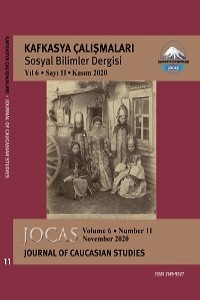Great Expectations: Studying My Own Community [Büyük Beklentiler: Kendi Etnik Grubunu Çalışmak]
Sosyal bilimlerde araştırmacının ‘içeriden’, araştırılacak grubun bir üyesi olması, araştırmacı ve araştırılan arasındaki ilişki ve mesafe açısından çıkabilecek sorunların dışında, araştırmacı için genelde avantajlı bir konum olarak kabul edilmektedir. Bu makale benim ‘içeriden’ bir araştırmacı olarak Türkiye’deki Çerkesleri çalışma deneyimlerimi ve bu deneyimlerin dar anlamda Çerkesleri, geniş anlamda ise etnik grupları çalışma açısından anlamını tartışmayı hedeflemektedir. İçeriden araştırma yapma pozisyonu, araştırılanlar açısından “büyük beklentiler” ve benim açımdan da son derece önemli avantajlar sağlamış olsa da bu çalışmanın dayandığı görüşmeler, araştırmacı ve araştırılan arasındaki yaş, cinsiyet ve sınıf temelli müzakereler içinden gerçekleşmiştir ve bu açıdan “içeri” ve “dışarı” kavramları sabit kavramlar olmamıştır. Bu makale sahada (dolayısıyla da akademik bilgi üretimi süreçlerinde) ‘içeriden’ araştırmacı ile araştırılan arasında sürekli müzakere edilen güç ilişkilerini ve konumsallığın akışkanlığını ve karmaşıklığını tartışmayı hedeflemektedir.
Anahtar Kelimeler:
Methodoloji, içeriden araştırma, konumsallık
Great Expectations: Studying My Own Community
The literature on insider methodology in social sciences underlines advantages for the insider researcher in addition to more subtle problems and pitfalls in terms of the relationship between the researcher and the researched. This paper aims to explore my experiences as the insider researcher studying Circassians in Turkey, my own community and discuss their implications for researching Circassians in particular and ethnic groups in general. As the insider researcher position provided “great expectations” on the side of the researched and hence some very critical advantages in the field for the researcher, it did not guarantee a fixed power relationship as the interviews in the field took place within a series of negotiations between the researcher and the informants in terms of age, gender, class etc. This article is an attempt to explore these negotiations, complexities and fluidities of positionality in the field and hence in the processes of academic knowledge production.
Keywords:
Methodology, insider research, positionality,
___
- Abu-Loghodi, Lila. “Writing against Culture.” Recapturing Anthropology: Working in the Present. Ed. R.G. Fox. Santa Fe: School of American University Press, 1991. 137-162.
- Altorki, Soraya. “At Home in the Field.” Arab Women in the Field: Studying Your Own Society. Eds. S. Altorki and C. F. El-Solh. Syracuse, New York: Syracuse University Press, 1988. 49-68.
- Baser, Bahar and Mari Toivanen. “Politicized and Depoliticized Ethnicities, Power Relations and Temporality: Insights to Outsider Research from Comparative and Transnational Fieldwork.” Ethnic and Racial Studies. (2017): 1-18.
- Besleney, Zeynel A. The Circassian Diaspora in Turkey: A Political History. Oxon: Routledge, 2014.
- Dwyer, Sonya Corbin and Jennifer L. Buckle. The Space Between: On Being an Insider-Outsider in Qualitative Research. International Journal of Qualitative Methods 8.1 (2009): 54-63.
- Dogan, Setenay Nil. “Ne Kadar Yakın Olsa da, Uzak: Türkiye'de Devlet ile Çerkesler Arasındaki İlişkiler.” Geçmişten Geleceğe Çerkesler: Kültür, Kimlik ve Siyaset. Eds. Sevda Alankuş and Esra Oktay Arı. Ankara: KAFDAV, 2014, 54-63.
- Erciyes, Cemre. “Diaspora of Diaspora: Adyge-Abkhaz Returnees in the Ancestral Homeland.” Diaspora 17.3 (2008): 340-361.
- Ertem, B. Gönül. Dancing to Modernity: Cultural Politics of Cherkess Nationhood in the Heartland of Turkey. Unpublished Ph.D. Dissertation, The University of Texas at Austin. 2000.
- Ganguly, Keya. “Migrant Identities: Personal Memory and the Construction of Selfhood.” Cultural Studies 6.1 (1992): 27-49. Greene, Melanie J. “On the Inside Looking In: Methodological Insights and Challenges in Conducting Qualitative Insider Research.” The Qualitative Report 19 (2014): 1-13. Hall, Stuart and B. Gieben. Formations of Modernity. Cambridge: Polity Press, 1992.
- Halstead, Narmala. “Ethnographic Encounters. Positionings within and outside the Insider Frame.” Social Anthropology 9.3 (2001): 307-321.
- Hamdan, Amani. “Reflexivity of Discomfort in Insider-Outsider Educational Research.” McGill Journal of Education 44.3 (2009): 377-404.
- Henry, Marsha. “If the Shoe Fits: Authenticity, Authority and Agency Feminist Diasporic Research.” Women's Studies International Forum 30 (2007): 70–80.
- Jacobs-Huey, Lanita. “The Natives Are Gazing and Talking Back: Reviewing the Problematics of Positionality, Voice, and Accountability among "Native" Anthropologists.” American Anthropologist 104.3 (2002): 791-804.
- Kondo, Doreen K. Crafting Selves: Power, Gender, and Discourses of Identity in a Japanese Workplace. Chicago: University of Chicago Press, 1990.
- Labaree, Robert. “The Risk of ‘Going Observationalist’: Negotiating the Hidden Dilemmas of Being an Insider Participant Observer.” Qualitative Research 2.1 (2002): 97-122. Mason, J. “Qualitative Interviewing: Asking, Listening and Interpreting.” Qualitative Research in Action. Ed. T. May. London: Sage, 2002. 225-241.
- Narayan, K. “How Native is a “Native” Anthropologist?” American Anthropologist 95.3 (1993): 671-686.
- Rosaldo, R. Culture and Truth: The Remaking of Social Analysis. Boston: Beacon Press, 1993.
- Schramm, K. “‘You Have your Own History: Keep Your Hands off Ours!’: On Being Rejected in the Field.” Social Anthropology 13.2 (2005): 171-183.
- Shami, Seteney. “Studying Your Own: The Complexities of a Shared Culture,” Arab Women in the Field: Studying Your Own Society. Eds. Soraya Altorki and C. F. El-Solh. Syracuse, New York: Syracuse University Press,1988. 115-138.
- Silverman, David. Doing Qualitative Research: A Practical Handbook. Thousand Oaks, Calif.: Sage Publications, 2000.
- Stephenson, J. B. and L. S. Greer, “Ethnographers in their Own Cultures: Two Appalachian Cases,” Human Organization 40(2) (1981): 123-130, 129.
- ISSN: 2149-9527
- Yayın Aralığı: Yıllık
- Başlangıç: 2015
- Yayıncı: Murat TOPÇU
Sayıdaki Diğer Makaleler
Yoksul Kuzey’in Güneyi: Kafkasya Öznelliği ve İkincil “Avustralizm” Kompleksi
Great Expectations: Studying My Own Community [Büyük Beklentiler: Kendi Etnik Grubunu Çalışmak]
Yeni Bir Vatan: Çerkeslerin Osmanlı İmparatorluğu’na Zorunlu Göçü (1864)
